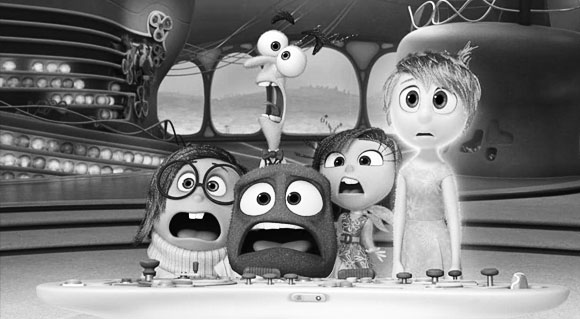
Inside Out – managing moods from the inside
Jackie reflects on a film with a difference
Earlier this year we went to see the movie, Inside Out. It is about an eleven-year old girl, Riley, and shows how her emotions impact her daily mood. It is an innovative idea, using cartoon characters to represent the emotions of joy, anger, disgust, fear and sadness. It makes the concept of emotions more tangible for young viewers.
The film takes Riley through various challenges, including a home move. One thing that struck me was that it gave the impression that her emotions were in control of her rather than giving an indication that in fact she, the girl, could have control of her own moods by choosing what she focused on. Instead, the characters representing the emotions sit behind a console manipulating her feelings as they choose. It is the emotions that decide which one of them would be helpful to her life. For me it would have been more constructive to demonstrate to young people that in fact they do have the ability to manage their emotions even in the midst of teenage angst – just as we all do.
Emotions don’t come from outside us, they come from inside us. Although we often feel first, the emotions are controllable to some extent as they are influenced by our thoughts and expectations of ourselves, others and life situations.
We do have the ability to manage our emotions. It is not about denying a feeling. We have the option to notice how we feel and recognise how each emotion is helpful to us. Emotions are a survival mechanism –disgust leads us to stop eating something that may be rancid or poisonous; anxiety keeps us from jumping off a high wall or climbing a tall tree; anger is appropriate should someone attack us; and sadness helps us to feel for someone or something we have lost and helps us to empathise with others. Joy helps draw us towards those aspects of our lives that nourish us and make us happy.
This does not mean that we always have to be joyful and happy. This would be neither realistic nor healthy. There are moments of sadness in everyone’s lives when it is absolutely appropriate to allow sadness in. Our underlying thoughts and beliefs shape our emotional responses to situations. However, these expectations of ourselves, others and of life are often below consciousness and can actually become ‘rules’ that drive our behaviour.
If we have expectations of ourselves that we should, ought or must achieve great things and get everything right, then it is likely that we shall end up both anxious and frustrated as no human being is perfect.
If we have expectations of others that they should, ought or must do what we want them to do, then we shall end up feeling resentful when they don’t come up to our expectations of them. This can also lead to lower self-esteem as we can feel disappointed by others even though the standard we set them was an impossibly perfect one.
If we have expectations of life or work situations that these events should, ought or must be as we want them to be, then we are likely to end up feeling disappointed and potentially demoralised that life is not going the way we want it to.
The key is to check our own beliefs and expectations – are they logical and realistic? Would everyone think about the situation in the same way? More importantly are they helping us to manage the situation and feel content?
If our current approach is not helpful then we can look at new ways to reframe the situation and approach it in a more constructive way. We can develop more rational and optimistic ways of thinking about ourselves. Accepting that all human beings are fallible allows us to be more compassionate and realistic, acknowledging that it is logical to seek excellence and do our best but illogical to expect ourselves to get everything right.
When relating to other people it is logical to prefer that they behave the way we want them to but illogical to demand that they do so. They also are fallible and have their own beliefs and responses to the situations they are facing, including us.
When managing life and work situations it is again logical to prefer that these work out the way that we want but it is illogical to expect that they must do so. If we expect that they must and they don’t then this will affect our mood. It is all about gaining perspective.
And so the important factor is the ability to step back and become the observer of our own life so as to review a situation. This way we can work out the best way to manage it both in terms of emotions and behaviours as our thoughts impact our emotions – and our emotions colour and shape our behaviours and actions. For example, if we are thinking that we are likely to screw up a presentation, our emotion will probably be anxiety. That anxiety is likely to lead us to feel less confident, breathe shallowly, forget our words and put our message across in a less powerful way. Switch the thought and we can switch the outcome.
So I wish that the film Inside Out had shown the audience how to question their own thoughts and how they impact their emotions.
 The key message is that how we think impacts how we feel. Choosing how we think and what we focus on alters our mood and emotion and our capability to manage situations.
The key message is that how we think impacts how we feel. Choosing how we think and what we focus on alters our mood and emotion and our capability to manage situations.
Tell your children …

Start The Discussion